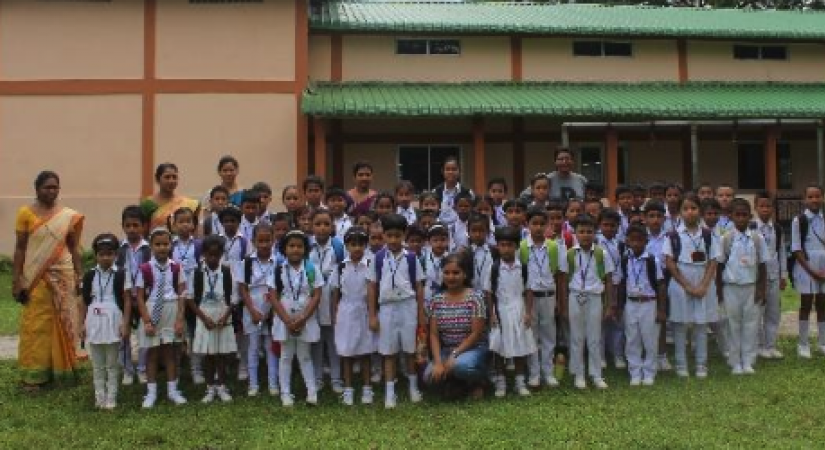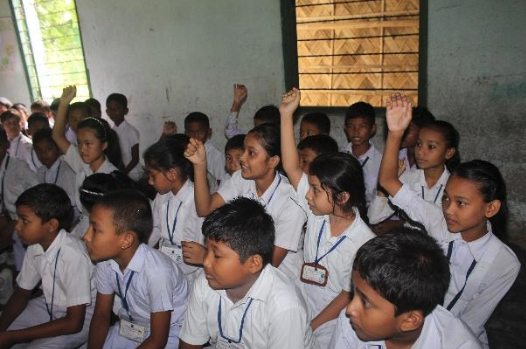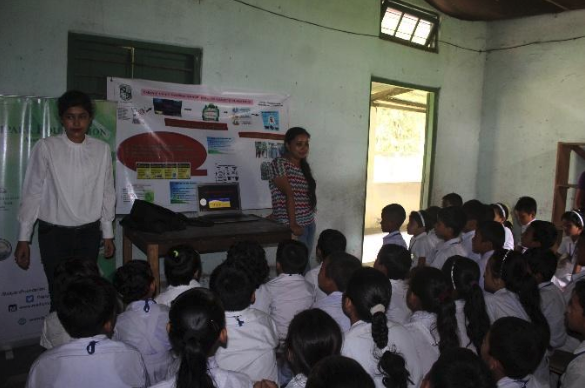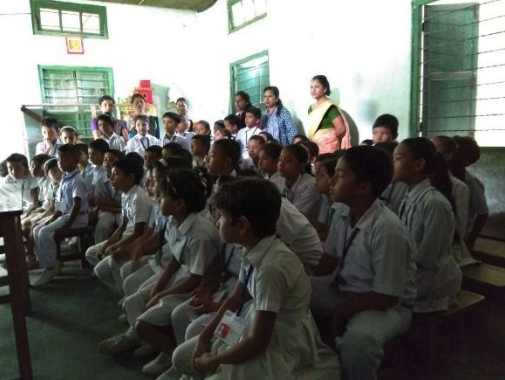One-Day NNS Program: Reuse of Waste Plastics
Highlights of the Event:
> The objective of the session was to engage school kids into learning creative ways to re-use waste plastic bottles and to become responsible for their footprint
> Develop an understanding on economic and sustainable development through Rural Futures framework and UNDPGs
> Total number of 57 students with 6 faculties participated in this outreach programme by Naturenomics™ School.
Achieving economic growth and sustainable development requires that we urgently reduce our ecological footprint by changing the way we produce and consume goods. For more than 50 years, global production and consumption of plastics have continued to rise and plastic waste continues to damage nature and the ecosystem that supports life on Earth.
In order to educate school students of Roopkonwar Sisuniketan School, Chariduar on the Rural Futures framework leading towards sustainable development goals of waste management and responsible consumption, a one-day outreach Naturenomics™ School program was conducted by Balipara Foundation with the students of IVth and Vth standard of Roopkonwar Sisuniketan School, Chariduar.
Students took the workshop as a welcome break to fuel their creativity and learn in a fun way about the significant impact of plastic waste on the environment and the different ways to recycle it. Led by Darshana and Sangita, the students were guided through a presentation on the global plastic scenario and explained that every day, gigantic amount of plastic leaks into the environment, the seas and the oceans. In the sea and the ocean, plastics disintegrate into tiny pieces, which are eaten by plankton, which are eaten by fish… which can end up in our food.
Concerned by the harmful impacts of plastic waste on life, water, the ecosystem, our food chain and other beings on the planet, the students enquired and discussed about solutions to protect the environment and on their role in building a healthy and safe planet. The discussion was followed by a creative session in which students were taught to redecorate plastic bottles and transform them into beautiful and usable items.
Developing a greater understanding on the sustainability and importance of healthy communities and environment, the students promised to use alternatives to plastics in their daily lives, such as bamboo straws, cloth bags, paper cups and plates and also encourage their friends and families to shift to sustainable products.
Impacts of the workshop:
> An insight into Rural Futures and Sustainable Development Goals
> Developing an understanding of resource management and careful choices for a safe ecosystem
> Learning about the threats facing a variety of organisms, including endangered species, the ill-effects of plastic and the urgent need to reduce plastic pollution Children understand their role in reducing plastic pollution and increasing recycling for a healthier environment
> Develop an understanding of the different types of plastics, and which can and cannot be recycled
> Inculcating an understanding that recycling involves a first-hand commitment to make the environment healthier.
> The objective of the session was to engage school kids into learning creative ways to re-use waste plastic bottles and to become responsible for their footprint
> Develop an understanding on economic and sustainable development through Rural Futures framework and UNDPGs
> Total number of 57 students with 6 faculties participated in this outreach programme by Naturenomics™ School.
Achieving economic growth and sustainable development requires that we urgently reduce our ecological footprint by changing the way we produce and consume goods. For more than 50 years, global production and consumption of plastics have continued to rise and plastic waste continues to damage nature and the ecosystem that supports life on Earth.
In order to educate school students of Roopkonwar Sisuniketan School, Chariduar on the Rural Futures framework leading towards sustainable development goals of waste management and responsible consumption, a one-day outreach Naturenomics™ School program was conducted by Balipara Foundation with the students of IVth and Vth standard of Roopkonwar Sisuniketan School, Chariduar.
Students took the workshop as a welcome break to fuel their creativity and learn in a fun way about the significant impact of plastic waste on the environment and the different ways to recycle it. Led by Darshana and Sangita, the students were guided through a presentation on the global plastic scenario and explained that every day, gigantic amount of plastic leaks into the environment, the seas and the oceans. In the sea and the ocean, plastics disintegrate into tiny pieces, which are eaten by plankton, which are eaten by fish… which can end up in our food.
Concerned by the harmful impacts of plastic waste on life, water, the ecosystem, our food chain and other beings on the planet, the students enquired and discussed about solutions to protect the environment and on their role in building a healthy and safe planet. The discussion was followed by a creative session in which students were taught to redecorate plastic bottles and transform them into beautiful and usable items.
Developing a greater understanding on the sustainability and importance of healthy communities and environment, the students promised to use alternatives to plastics in their daily lives, such as bamboo straws, cloth bags, paper cups and plates and also encourage their friends and families to shift to sustainable products.
Impacts of the workshop:
> An insight into Rural Futures and Sustainable Development Goals
> Developing an understanding of resource management and careful choices for a safe ecosystem
> Learning about the threats facing a variety of organisms, including endangered species, the ill-effects of plastic and the urgent need to reduce plastic pollution Children understand their role in reducing plastic pollution and increasing recycling for a healthier environment
> Develop an understanding of the different types of plastics, and which can and cannot be recycled
> Inculcating an understanding that recycling involves a first-hand commitment to make the environment healthier.






